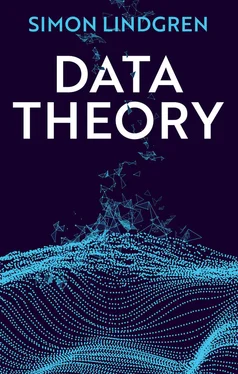Empirically speaking, this is a book about social media politics (see Chapter 2). In a set of different case studies, it will say things about how social media are used today for various political ends, under which circumstances, and to what effects. The underlying and driving scholarly aim of the book, however, is more methodological, and is about developing an analytical approach for bringing together the Verstehen and the Evidenz in general, and social theory and data science in particular. This agenda, rather than any one core research question about social media politics, is the main driving force through the chapters that follow.
I wrote this book as a reminder that, also (or maybe especially) in the age of datafication, data (still) need theory, and theory (still) needs data. The book provides a suggestion as to how one may conceptualise and do research that aligns with that insight. The chapters in this book include theoretical and methodological discussions, as well as a number of explorative and experimental case studies, focused on how social media politics can be analysed based on these premises. Ultimately, the book presents an approach that, while being data-driven and making use of social media data, and computational data science techniques, is still firmly set within a theoretically sensitive and sociologically interpretive framework of analysis.
Sociological theory, and often such theories that were developed in the pre-digital age, can contribute immensely to our understanding of things that we are now in the process of, maybe unnecessarily, inventing new names for: ‘viral communication’, ‘user-generated content’, ‘the blogosphere’, ‘online hate’, ‘cyber bullying’, and so on. I do not mean that such words, at least not all of them, are merely superfluous synonyms for things that we already have names for. Nor do I claim that any old theory is always better than a new one, or that such old theories can be applied unproblematically to twenty-first-century phenomena without modification. But, in many cases, we run the infamous risk of throwing the baby out with the bath water. When researching the peculiarities and novelties of interaction and communication in the datafied society, we risk mistaking theories about general patterns of social life as being obsolete just because they were developed in non-digital contexts.
The already established theories are useful because, even though settings change, we may often be dealing with the same underlying social forms as before. Georg Simmel (1895, p. 54) argued that the most important task for the sociologist is to separate analytically the form of social life from its content, even though the two are in reality inseparably united. The aim of the analysis must be to detach the forms from their contents and to bring them together systematically: ‘For it is evident that the same form […] can arise in connection with the most varied elements.’ Simmel continued to explain that:
We find, for example, the same forms of authority and subordination, of competition, imitation, opposition, division of labor, in social groups which are the most different possible.
(Simmel, 1895, p. 55)
Let us assume, to take but one example, that we were to establish empirically that people on social media sometimes find themselves disillusioned by their own social media use, and that they feel as if they are just like cogs in a bigger machine beyond their individual control. Let us also assume that our analysis made us think that this may even be a form of oppression or exploitation, where social media conglomerates make a profit from what disillusioned and exploited users post online. We may simply invent a new flashy theoretical concept for this, say: ‘digital brainwash’ or ‘social media disconnect’. But we could also make the effort of going back to already established social theories. In my present example, a good option may have been Karl Marx’s 1844 theory about alienation (Marx, 1844, pp. 69–84). The social form of alienation, in that case, may transcend the contexts of nineteenth-century industrial capitalism and social life on the twenty-first-century internet. Once we see that, we also enable other insights such as, for example, that our present-day society may still be quite similar in some respects to nineteenth-century industrial capitalism.
I do not mean to say that such theoretical connections are not already made by many scholars, nor do I mean that anyone who does not do it at every opportunity is lazy or wrong. I myself am a repeat offender. And, conversely, it may indeed sometimes be a good idea actually to invent new concepts – how else would theories develop? – and in most cases there needs to be some sort of updating or modification of the old theory that is re-employed. On the one hand, this book is an explicit effort to explore and show how to apply existing, trusty, and well-worn social theory systematically, through data science, to social media politics with this kind of ambition and aspiration. On the other hand, the book is just as much an encouragement to combine and re-invent theories in eclectic ways. I will return, throughout the book, to issues of theory, as universal truth versus theory, as emergent and constantly renegotiated.
Data scientists Rachel Schutt and Cathy O’Neil (2013, p. 9) argue that data scientists have much to benefit from collaborating with social scientists. This, they write, is because social scientists ‘do tend to be good question askers and have other good investigative qualities’. They write about the hyped and still emerging speciality of data science that ‘it’s not math people ruling the world’. Rather, they argue that when different ‘domain practices’ intersect with data science, each such practice is ‘learning differently’ (Schutt and O’Neil, 2013, p. 219). Taking my cue from Schutt and O’Neil, I ask in this book what type of such different learning – which methodological developments – can follow when sociology meets data science.
This is obviously a vastly open question with a multitude of potential answers. Therefore, my suggestion, which draws to a great extent on my personal methodological and theoretical preferences as an interpretive sociologist, is but one possibility. The main idea that I am putting forward is that the data-drivenness of interpretive sociology, as formulated as a hands-on framework by methodologists such as Barney Glaser and Anselm Strauss (1967), and particularly Glaser’s (1978) notion of ‘theoretical sensitivity’, can be dusted off and brought together with the data-drivenness of data science practices.
Many would say that the respective general views on science and methodology between big data and grounded theory research are too divergent, to the point that they are even incompatible. I do not believe that to be the case. Still, to experiment with merging methods that are labelled ‘qualitative’ and ‘quantitative’ is not a good idea if you want everyone to agree with you. In both camps (because sadly, that is still what they are), it is equally easy to find people who are dogmatic. So, to find productive ways across, there is definitely a need to think unconventionally. Feyerabend had some good ideas about how science in general could do well with a dose of theoretical anarchism, and claimed that research methods must always be opposed and questioned:
The idea of a method that contains firm, unchanging, and absolutely binding principles for conducting the business of science meets considerable difficulty when confronted with the results of historical research. We find, then, that there is not a single rule, however plausible, and however firmly grounded in epistemology, that is not violated at some time or other. It becomes evident that such violations are not accidental events, they are not results of insufficient knowledge or of inattention which might have been avoided. On the contrary, we see that they are […] absolutely necessary for the growth of knowledge.
Читать дальше












